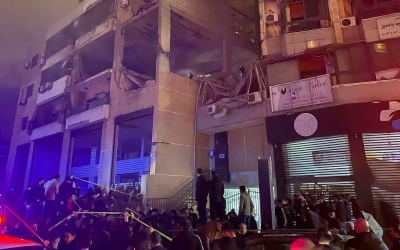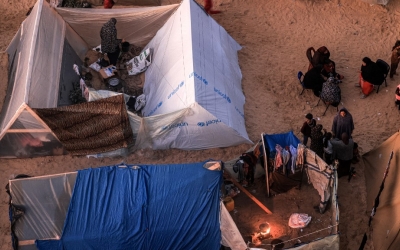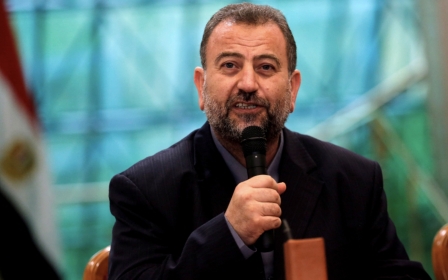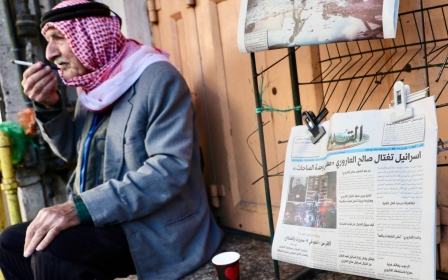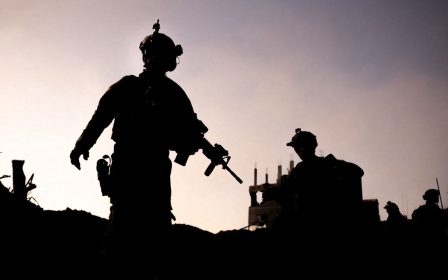War on Gaza: Hezbollah's Nasrallah says Saleh al-Arouri killing 'will not go unpunished'
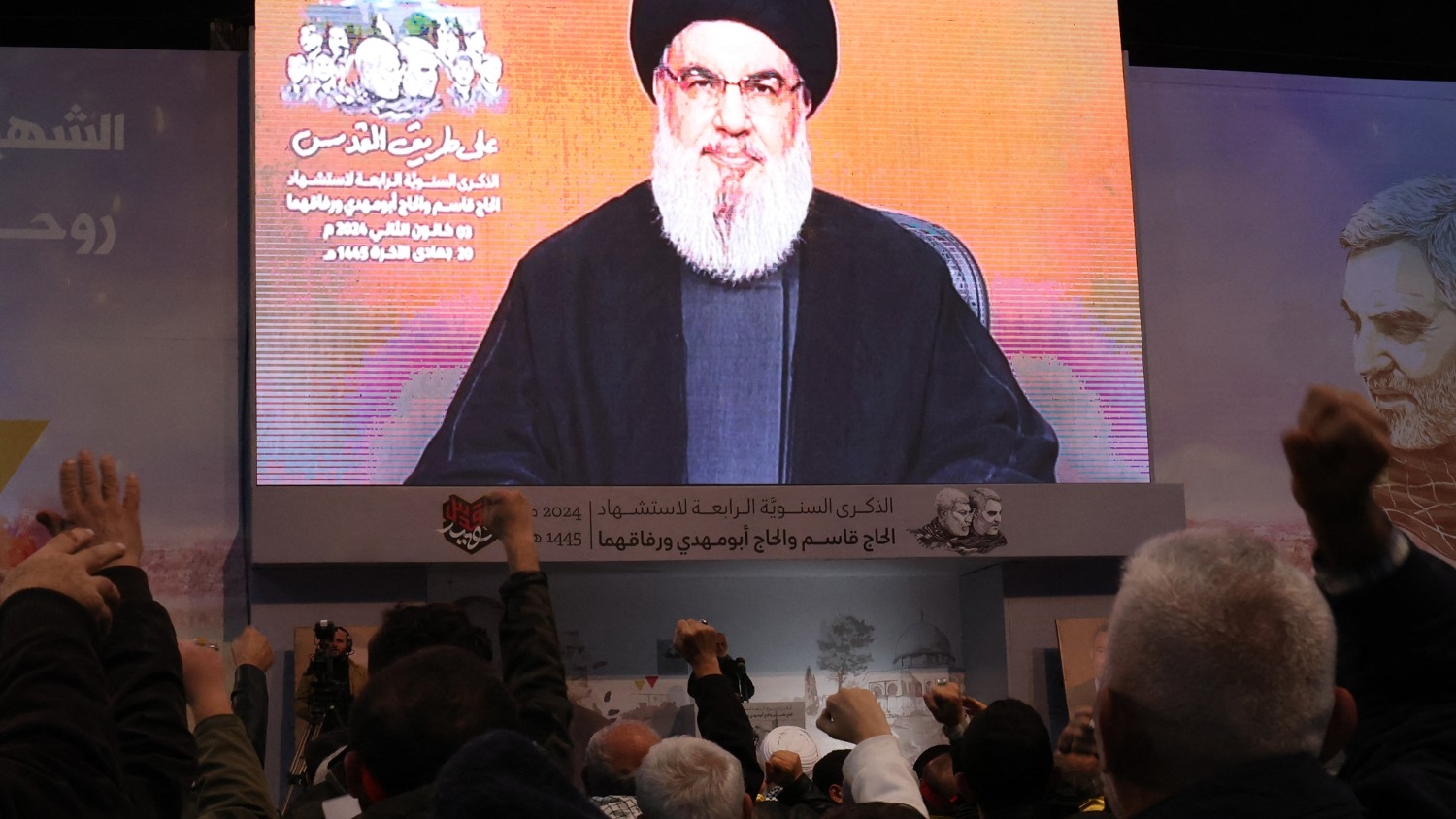
A day after an Israeli drone strike killed senior Hamas leader Saleh al-Arouri in the Beirut neighbourhood of Dahiyeh, fears of all-out war between Lebanon and Israel were in the air, ahead of a speech by the Hezbollah leader, Hassan Nasrallah.
Nasrallah addressed the killing in the last part of a one-hour-and-twenty-minute televised speech he gave on Wednesday, in which he said Hezbollah could not remain silent.
"We do not need to say much, and just like we said in our official statement yesterday, this serious crime will not go unanswered or unpunished," Nasrallah said.
The speech by Nasrallah had been pre-planned for the anniversary of the assassination of top Iranian general Qassem Soleimani, who was killed in a US drone strike in Iraq in 2020.
"The battlefield is there. Time is there, the nights wait for us all, and I will see you again."
New MEE newsletter: Jerusalem Dispatch
Sign up to get the latest insights and analysis on Israel-Palestine, alongside Turkey Unpacked and other MEE newsletters
The Hezbollah leader told the audience in Beirut that the killing of Arouri was a sign that Israel was "trying to present an image of victory" when the country's military has not achieved its goals in its military campaign in Gaza.
Nasrallah made over a dozen points in his speech. He praised Yemen's Houthis for its attacks on ships in the Red Sea and Iran-aligned factions attacking American bases in Iraq. The leader, however, emphasised that these developments were not coordinated by Tehran and were done independently of each other.
Israel has still not officially claimed responsibility for the strike that killed Arouri and two commanders of Hamas's military wing, the al-Qassam Brigades. However, Israel has said it is ready to face any retaliation from the Lebanese movement, Hezbollah, an ally of Hamas.
Follow Middle East Eye's live coverage of the Israel-Palestine war
Experts told Middle East Eye that they expect Hezbollah's retaliation over the Arouri killing to be significant, but that it would likely fall short of an all-out war, as the group remains adamant on avoiding such a scenario.
Earlier on Wednesday, 130 people were killed in twin explosions near the cemetery where Soleimani is buried. Iranian officials called the explosion a "terrorist attack".
South Africa's genocide case against Israel
Turkey, a country where millions have come out onto the streets in support of Palestine over the past few months, has officially backed South Africa's application at the International Court of Justice to determine whether Israel is committing genocide in Gaza.
“Israel's murder of more than 22,000 Palestinian civilians, the majority of whom were women and children, in Gaza for nearly three months should not go unpunished in any way," Turkish foreign ministry spokesperson Oncu Keceli said in a statement.
"Those responsible for this must be held accountable before international law."
South Africa filed the case late last month and is also seeking an ICJ order demanding that Israel halt its military operations in the besieged enclave.
The announcement by Ankara comes a day after Malaysia said it would be backing the South African petition as well.
In its application, South Africa named Turkey, Malaysia, and around a dozen other countries which have stated that Israel's actions in Gaza constitute genocide.
Israel, which has rejected the case, is set to appear before the ICJ next week to defend itself against the accusation of genocide.
Reports of relocating Gaza's population
The Israeli daily, Zman Yisrael, reported on Wednesday that Israeli officials are in secret talks with several African countries to accept Palestinian refugees from Gaza.
The report named "Congo" as willing to accept thousands of Palestinian refugees, but did not specify whether it was referring to the Democratic Republic of Congo or the Republic of Congo.
The report said that the policy to rid Gaza of its Palestinian population "is slowly becoming the leading and official policy of the government and the coalition".
The Israeli government, according to Zman Yisrael, has purposefully been saying that the move would be a "voluntary" migration to avoid saying that Palestinians are being ethnically cleansed from Gaza.
Israel’s Minister of Intelligence, Gila Gamaliel, told the newspaper on Tuesday that "voluntary [emigration] is the best and most realistic plan for the day after the fighting".
The report appears to be in direct contradiction to what the Biden administration has said about the calls to forcibly displace Palestinians from Gaza.
The State Department put out a strong statement on Tuesday condemning remarks from two Israeli cabinet ministers, Bezalel Smotrich and Itamar Ben Gvir, who have advocated for the resettlement of Gaza's Palestinian population to other countries.
"This rhetoric is inflammatory and irresponsible. We have been told repeatedly and consistently by the Government of Israel, including by the Prime Minister, that such statements do not reflect the policy of the Israeli government," State Department spokesperson Mathew Miller said in a statement.
"They should stop immediately."
Forced displacement of Palestinians
Amid the reported Israeli talks about whether to forcibly move Palestinians to other countries, Israel's military is continuing to drop leaflets on Gaza's residents, calling on them to move to other parts of the besieged enclave.
The warnings from the military are forcing Gaza residents to relocate multiple times after already having been displaced by Israel's military campaign.
"We fled from Beit Lahia to Gaza City and then to al-Nusairat Camp. Today, they instructed us to flee our houses in blocks 2348, 2325, 2347, 662, 2322, 2324, and 2346, including al-Salam, al-Shouhada, Besan, and Alyarmouk neighbourhoods," Laura, a displaced mum of four in block 2322 of the al-Nuseirat camp told MEE.
"This is our third evacuation. Every time we flee to a safer area, they mark it as unsafe again. We feel helpless and hopeless. We have been trying to find a car to move us but no driver is willing to drive under bombardment,” she added.
Israeli forces continue calling on Palestinians to go to Rafah, a town on the southern border of Gaza near Egypt. Rafah has become severely overcrowded as a result, causing starvation and disease to spread, raising concerns that it could cause more preventable deaths.
Meanwhile, Rafah is not a sanctuary from the war, as Israeli air strikes continue to pound the town, killing dozens including children.
"They are making life hell for us. I am a mum of four children who are terrified by the bombardment. We fled our homes without clothes or money. The situation is dire, and the world is silent," Laura said.
Middle East Eye delivers independent and unrivalled coverage and analysis of the Middle East, North Africa and beyond. To learn more about republishing this content and the associated fees, please fill out this form. More about MEE can be found here.


